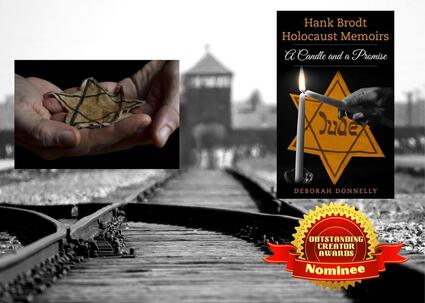|
Score: 96/100 (9.6 out of 10)
We start the spring 2022 cycle with what may be the greatest book we've read so far at the Outstanding Creator Awards. This is one of the rare times we were tempted to give a book a 9.7 out of 10 (which would be our highest rating ever). Our eyes are still wet. Our nerves are still rattled. Our hearts are still torn. Our souls are filled with a sense of something we can't quite name... relief? Gratitude? Relief and gratitude that we do not live in a time and place where this genocide is occurring. Gratitude that we have here one of the greatest and most tragic stories ever told along with someone with the courage to tell it. This book is heartbreaking. This book is beautiful. This book is mesmerizing. This book is heavy and deep. This book is significant, important, and meaningful in a way that few other works can compare to. This book is perhaps the best memoir on the Holocaust ever written, and we've read them all. This may be a controversial statement, but the issue with most Holocaust books is that most either choose to avoid particulars and details for the reader's protection or sanity (most notable in “Night” by Elie Wiesel, explicitly stated by the author) or focus on life before internment with the assumption that the reader will fill in the blanks and realize the tragedy for themselves. The special and unique thing about this book is that it is presented as is—this is what happened, and this is how it happened. No frills, no fluff, no let's not talk about this. That's not to say that the narrator's subjective voice doesn't come through from time to time, but it doesn't rob the story of its pureness. It, in fact, adds to it. The reason for this may be that this tremendous and true tale by Holocaust survivor Hank Brodt is shone through the lens of his youngest daughter, Deborah Donnelly, who is an absolutely, positively fantastic writer! The way she's able to communicate her father's story and thoughts is borderline magical. It's haunting. The words on these pages are unforgettable. They're sharp. They're concise. They're understandable. And they never cease to be interesting. It's not in—and we hate to use a term with these connotation but we have none better—a voyeuristic way. We aren't just seeing and reading about Hank's experiences, we are there with Hank between those fences, in that ghetto, on that cattle car. We hurt when he hurts. We're uncomfortable when he's uncomfortable. We're anxious when he's anxious. We're angry when he's angry. We love when he loves. We're hopeful when he's hopeful. We lose when he loses. We're happy when he's happy. When he's sprayed with “stinging disinfectant” we can feel some of that sting. When Hank feels something and wants to do something, we feel it too and we want to do it too. There's a scene in which he decides to try to scrape off his brand at the expense of his skin because of his resolution that no human being should ever be branded. There's a scene in which he reaches into his cup of water to try to quench some of the thirst of a 50 year old on the cattle car who has given up hope trying to drink. There's a scene in which he asks a German officer a question about what crime he committed, and we realize it's a question that was burning in us as much as it was burning in him. Something else that makes this book special is how detailed it is about life in the concentration camps. There's a scene in which Hank was questioned by a German officer who seemed to be growing disillusioned with the Nazis. There's a scene in which Hank overheard an argument between a German soldier and the SS over the treatment of prisoners in which the soldier implored that they give the thirsty Jews water. Hank tells us that not all the Germans were evil or bad. Hank also reveals some of the useful things he did to survive such as protecting and saving his shoes and cup or waiting at the end of the soup line to try to get the heavier foods (like carrots) at the bottom of the bowl. It's powerful. This book is just so powerful and so well-written. It is presented with so much tact and respect as well. This is also the most genuine gratitude and optimism we've ever read in a book. Throughout this book, Hank has so little, yet he saves a bit of himself. He says that he wanted to preserve his humanity and be the good person that his mother raised so that if he ever saw him again, he'd at least be recognizable to her. We see that fight and struggle in him to preserve his humanity. What's more is that Hank in this book shares what seems to be an increasingly unpopular opinion: the good that America has done and the positive place it has in the world. Hank is grateful to America and to all the soldiers who served to defeat the Germans and liberate the Jews. He sees America as a beacon of hope for others suffering and dying in the world. Hank is grateful, and we are grateful to him, and we're grateful to God for allowing us to read his story. It is a powerful reminder to everyone of what can result when good men do nothing and when we forget history. Check out the book here!
0 Comments
Leave a Reply. |
Archives
July 2024
Categories |

 RSS Feed
RSS Feed